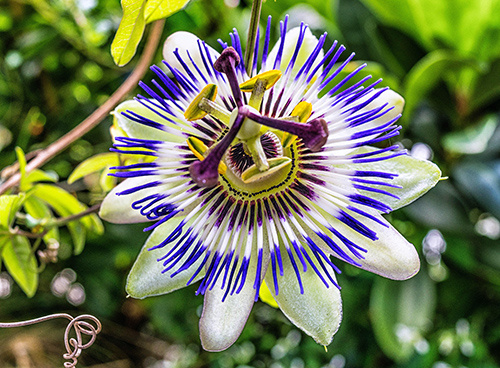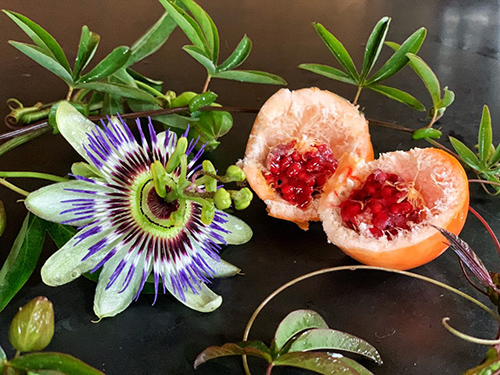Contents
Passion flower benefits first attracted European travelers’ attention to the New World, who saw in the diverse organs of its beautiful flowers the representation of the instruments used in the Crucifixion: whip, nails, and hammer.
The plant was introduced in Europe and grown as an ornamental vine until the late 19th century. Among the many passion flower benefits, it was found to have a strong sedative effect on the nervous system.
Scientific Facts
- Synonyms: Maypops, passion vine
- French: Passiflore, fleur de la passion
- Spanish: Pasionaria, granadilla, maracuya
- Habitat: Native to the southern United States and Mexico, it is widespread in the tropical regions of Central and South America, mainly in the West Indies and Brazil. It grows in dry, protected areas. Naturalized in southern European Mediterranean countries.
- Description: A woody-stem vine of the Passifloraceae family with beautiful white or red flowers divided into three lobes. The
- Parts used: Flowers, leaves, and fruits
Passion Flower Benefits
The FLOWERS and LEAVES of maypops (another name for this plant) contain small amounts of indole alkaloids, flavonoids, various steroids, and pectin. It is not well known which substances the plant owes its sedative, antispasmodic, and narcotic actions to, though it is likely due to the combination of them all. Its main benefits are:
Anxiety, Nervousness, Stress
The passion flower functions as a gentle sedative without the danger of dependency or addiction. It is the perfect plant for folks who are experiencing nervous tension. The passion flower, a gift from the ancient Aztec empire, is described in the Larousse Dictionary of Healing Plants as:
“seeming to be the most important plant in our culture.”

Insomnia
Natural sleep is induced by the herb without sleepiness or depression upon awakening. Given its low toxicity, it may be given to youngsters.
Epilepsy
Passion Flower is a supplemental therapy that lessens the frequency and severity of epileptic episodes.
Alcoholism and Drug Addiction
The administration of passion flowers during the first stages of alcohol, heroin, and other drug rehabilitation therapies has resulted in some intriguing research. With the help of this herb, the so-called “cold turkey” withdrawal symptoms are easier to handle and have less of an adverse effect on the body. Its sedative effects allow for better endurance for drug consumption in alcoholics and drug addicts, thus overcoming the anxiety of abstinence. In these cases, the plant must be used under medical supervision.
The FRUITS of the passion flower are called passionfruit, and they are rich in provitamin A, various organic acids, and vitamin C. They are refreshing and invigorating and are highly recommended for physical tiredness, infectious diseases, and febrile recovery.
Passionflower is mainly used to remedy nervous conditions, including hysteria, nervous headaches, insomnia, and restlessness. It is also primarily combined with other herbs as a prolonged treatment. The herb is helpful for stress-related disorders, anxiety, and neuritis. Children also benefit from Passionflower when suffering from nervousness, muscle twitching, and irritability. Older people can benefit from the herb when suffering from sciatica and nerve debility. It can reduce blood pressure and has a gentle sedative effect.
The plant can treat back tension, convulsions, eye tension, coughs, spasms, hiccups, headaches, fevers, and reduced pulse during high fevers. In addition, it can stimulate sweating.
Purple Passion Flower
Another Passiflora species is Passiflora edulis Sims. (=Passiflora laurifolia F. Vill.), Often known as passionfruit, it grows in Brazil and the West Indies. As its name suggests, it is a purple passion flower with purple blossoms. The species of the genus Passiflora is most well-known in America.
Soft drinks created with the gelatinous flesh of the purple passion flower have a really “tropical” taste. Purple passion flowers produce a sweet, somewhat acidic fruit. Its seeds may be used to produce edible oil. It is not, however, regarded as an actual medicinal herb.
One of the finest surviving relics of the Mayan civilization is the pyramids at Palenque, in the Mexican state of Chiapas. Aztecs and Mayans knew and used the beautiful flowers of maypops, whose soothing effects on the nervous system, were discovered in Europe in the 19th century.
Top Rated Passion Flower Supplements
Preparation and Dosage

- Infusion: The ideal way to take advantage of passion flower benefits is with an infusion of flowers and leaves, prepared with 20-30 g per liter of water and left to rest for two or three minutes before drinking. Two or three cups daily are recommended; if desired, they may be honey-sweetened. One more may be taken before bedtime in the case of insomnia.
- In alcohol or drug-withdrawal treatment, the infusion is more concentrated (up to 100 g per liter) and sweetened with honey. The dose depends on the patient’s requirements.
Tincture: Take fifteen to sixty drops in water as needed. Fluid Extract: Take ten to twenty drops as needed. Powder: Take one to two #0 capsules (3 to 10 grains) as required.
NOTE: Some herbalists think using professionally prepared herbal medications is best.
In Germany, the entire plant was approved to treat nervous tension and nervous restlessness and is considered especially helpful in anxiety or sleep disturbances resulting from perturbation. The fruit is delicious and edible.
WARNING: Avoid passionflower during pregnancy because it can cause uterine stimulation.
DISCLAIMER: All content on this website is presented solely for educational and informational objectives. You should not rely on the information provided as a replacement for advice, diagnosis, or treatment from a qualified medical expert. If you are pregnant, nursing, or have any preexisting medical concerns, you should talk to your doctor before using any herbal or natural medicines.
REFERENCES
- George D. Pamplona-Roger, M.D. “Encyclopedia of Medicinal Plants.” George D. Pamplona-Roger, M.D. Encyclopedia of Medicinal Plants. Ed. Francesc X. Gelabert. vols. 1 San Fernando de Henares: Editorial Safeliz, 2000. 167,168. Print.
- Vance Ferrell Harold M. Cherne, M.D. The Natural Remedies Encyclopedia [Book]. – Altamont, TN: Harvestime Books, 2010. – Vol. Seventh Edition: 7: pp. 172, 173. [Passion Flower Benefits]
- Mount Sinai – New York: https://www.mountsinai.org/health-library/herb/passionflower
- WebMD: https://www.webmd.com/vitamins/ai/ingredientmono-871/passionflower
